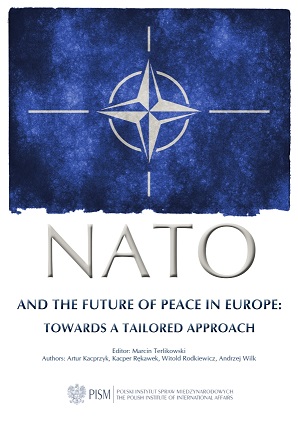NATO and the Future of Peace in Europe: Towards a Tailored Approach
NATO and the Future of Peace in Europe: Towards a Tailored Approach
Author(s): Artur Kacprzyk, Kacper Rękawek, Witold Rodkiewicz, Andrzej Wilk
Contributor(s): Marcin Terlikowski (Editor), Brien Barnett (Editor)
Subject(s): Politics / Political Sciences, Politics, Social Sciences, Governance, Sociology, International relations/trade, Security and defense, Military policy, Studies in violence and power, Radical sociology , Geopolitics, Peace and Conflict Studies
Published by: PISM Polski Instytut Spraw Międzynarodowych
Keywords: NATO; peace and conflict studies; future of peace; Europe; collective security; terrorist attacks; terrorism; terrorist networks;
Summary/Abstract: “NATO exists for peace by collective security”. This quote by Lord Ismay, the first Secretary General of NATO, encapsulates the central purpose of the Alliance, which has been directly tasked with preserving the peace in Europe for over 60 years, longer than any other organisation on the continent. Hence, today’s considerations on the future of NATO, its policies and capabilities, are in fact tantamount to deliberations on the future of European peace and on how to maintain it. At the same time, answers to pressing threats and challenges are urgently sought, as the European security environment is undergoing a structural change. This transformation is primarily characterised by rapid developments and significant interconnections between multiple threats of a military, asymmetric and non-military nature. After Russia forcibly annexed Crimea and then intervened militarily in eastern Ukraine, military aggression, considered a remote threat for the last two decades, is back on the European security landscape. In the strategic vicinity of Europe, non-state actors driven by radical ideology, particularly the so-called Islamic State in Iraq and Syria (ISIS) and Al-Qaeda, have conquered large amounts of territory and established quasi-states, which enabled them to inspire or directly control terrorist networks in Europe, North Africa and the Sahel. Attacks such as those in Paris, Brussels or Bamako testify to their growing capabilities.
Series: PISM Reports
- E-ISBN-13: 978-83-64895-80-7
- Print-ISBN-13: 978-83-64895-79-1
- Page Count: 28
- Publication Year: 2016
- Language: English
- eBook-PDF
- Table of Content
- Introduction

